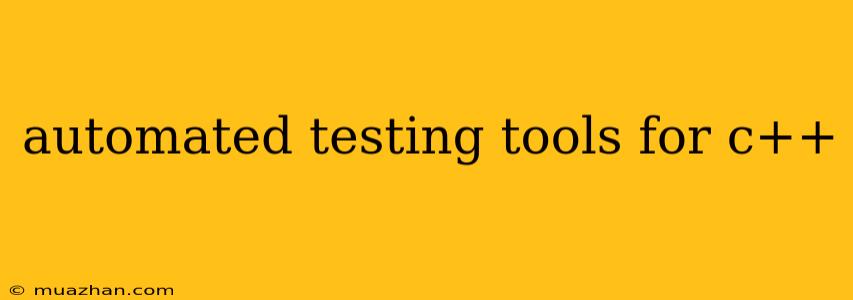Automated Testing Tools for C++
Automated testing is crucial for ensuring the quality and reliability of C++ software. It helps developers catch bugs early in the development cycle, improve code coverage, and maintain code consistency. There are numerous testing tools available for C++ developers, each with its unique features and benefits. Here are some of the most popular and powerful options:
Unit Testing Frameworks
1. Google Test (gtest)
- Description: A widely used, mature, and feature-rich unit testing framework developed by Google. It provides a comprehensive set of testing macros, assertion functions, and test fixtures for creating and running unit tests.
- Key Features:
- Parameterization: Allows running tests with different sets of input data.
- Death Tests: Enables testing code that is expected to terminate abnormally.
- Mocking and Stubbing: Supports creating mock objects for testing interactions with external dependencies.
- Extensive Documentation: Provides thorough documentation and tutorials for easy learning and implementation.
2. Catch2
- Description: A modern, header-only testing framework with a concise syntax and a focus on ease of use. It offers a wide range of features for writing expressive and readable tests.
- Key Features:
- Simple Syntax: Allows writing tests in a natural, C++-like style.
- Generative Tests: Supports generating multiple test cases from a single template.
- Exception Handling: Provides mechanisms for handling exceptions during test execution.
- Built-in Assertions: Offers various assertion functions for comparing values, checking conditions, and validating expectations.
3. Boost.Test
- Description: A powerful and flexible testing framework part of the Boost C++ libraries. It provides a wide range of functionalities for creating unit tests, functional tests, and integration tests.
- Key Features:
- Data-Driven Tests: Enables running tests with different data sets.
- Test Suites: Allows organizing tests into logical suites for better management.
- Fixture and Test Case Templates: Provides templates for creating reusable test fixtures and test cases.
- Support for Various Platforms: Works seamlessly across various operating systems and compilers.
Mock Object Frameworks
1. Google Mock (gmock)
- Description: A popular framework for creating mock objects in C++. It integrates seamlessly with Google Test and provides a user-friendly syntax for defining and using mock objects.
- Key Features:
- Fluent API: Offers a readable and expressive API for specifying mock behavior.
- Expectations: Enables setting expectations on mock object interactions.
- Mock Functions: Allows defining mock functions with customizable behavior.
- Spies: Provides mechanisms for observing interactions with real objects.
2. FakeIt
- Description: A lightweight and header-only mock object framework for C++. It focuses on simplicity and efficiency, making it easy to use and integrate into existing projects.
- Key Features:
- Minimal Dependencies: No external libraries required.
- Flexible Syntax: Provides a straightforward syntax for defining mock objects and interactions.
- Customization: Allows customizing mock object behavior through function overloads and callbacks.
- Seamless Integration: Works well with various unit testing frameworks, including Google Test and Catch2.
Integration Testing Frameworks
1. Catch2
- Description: While primarily known as a unit testing framework, Catch2 also provides functionalities for integration testing. It allows running tests against external dependencies or simulating real-world scenarios.
- Key Features:
- Fixture Support: Enables creating fixtures that set up and tear down dependencies for integration tests.
- Test Execution Control: Offers mechanisms for controlling the order of test execution and managing dependencies.
- Test Reporting: Provides comprehensive test reports with detailed information about failures and execution times.
2. Boost.Test
- Description: Similar to Catch2, Boost.Test also supports integration testing with its features for setting up and running tests against external systems or real-world environments.
- Key Features:
- Test Suites and Fixtures: Allows organizing tests into suites and defining reusable fixtures for integration testing.
- Test Execution Control: Provides options for controlling the execution order and managing dependencies for integration tests.
- Test Reports: Generates detailed reports with information about test execution results and failures.
Code Coverage Tools
1. gcov
- Description: A built-in code coverage tool provided by the GCC compiler. It generates coverage data that can be analyzed to determine the lines of code executed during test runs.
- Key Features:
- Simple Integration: Integrates seamlessly with GCC compilation process.
- Line Coverage: Provides basic line coverage data.
- Branch Coverage: Offers limited support for branch coverage analysis.
2. LCOV
- Description: A tool for generating and displaying HTML reports from gcov data. It provides a user-friendly interface for visualizing code coverage information.
- Key Features:
- HTML Report Generation: Generates interactive HTML reports for easy code coverage analysis.
- Line and Branch Coverage: Displays both line and branch coverage metrics.
- Filtering and Sorting: Allows filtering and sorting coverage data for focused analysis.
3. SonarQube
- Description: A platform for code quality analysis that includes code coverage analysis. It offers a comprehensive suite of features for tracking code coverage, identifying code smells, and improving code quality.
- Key Features:
- Code Coverage Analysis: Provides detailed code coverage reports with line, branch, and function coverage metrics.
- Code Quality Metrics: Offers a wide range of code quality metrics, including complexity, maintainability, and security vulnerabilities.
- Code Review and Issue Tracking: Enables code reviews and issue tracking for continuous code improvement.
These tools provide a solid foundation for building a robust and effective testing process for your C++ projects. Choosing the right tools will depend on your specific needs and project requirements. It is recommended to explore the features and capabilities of each tool to determine the best fit for your development environment.
